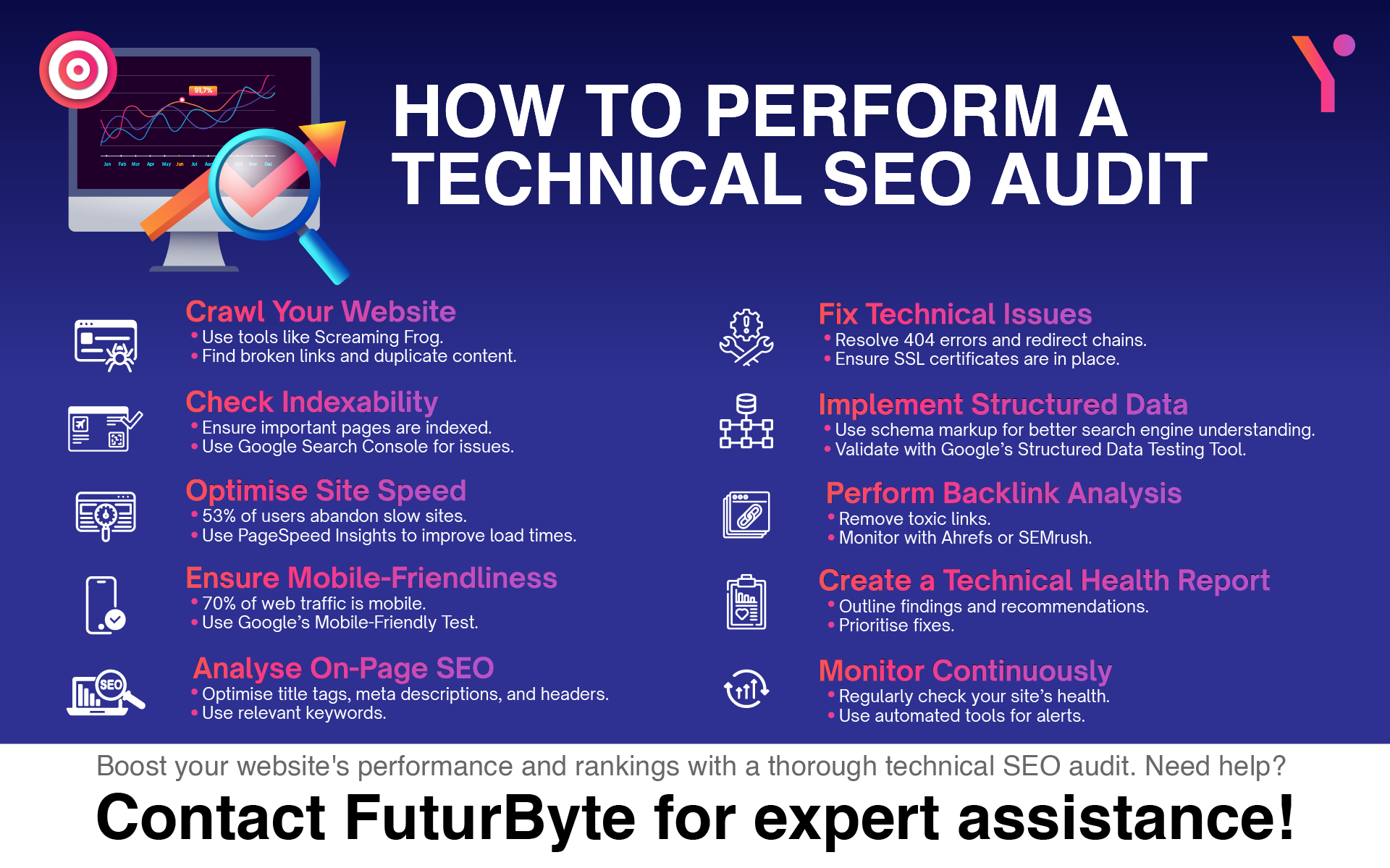Introduction
Learn about the importance of a technical SEO audit in this blog and why any website owner should go with it. Understand how the audit will lead to improved user experience, attract organic traffic, and play an important part in the success of your website.
Consider your website as a massive library. Search engines such as Bing or Google behave as librarians, crawling through the shelves (the content and code of your website) to understand the information you present.
However, what will happen if there are broken shelves or hidden sections? This is where the question of “how to perform a technical SEO audit?” is often raised. Well, note that the audit is a detailed analysis that brings forth the hidden issues affecting your website’s search engine visibility.

The following table summarises important aspects of a technical SEO audit and must be taken note of by any party that wishes to utilise technical SEO services:
| Aspect | Description |
| Website Structure and Architecture | Analyses your website’s organisation, improving user experience and navigation |
| Crawlability and Indexing | Make sure that search engines both access and understand your website’s content |
| Mobile Friendliness | Examines how well your website shows on mobile gadgets, which is vital for today’s browsing habits. |
| Page Speed Optimisation | Assesses website load times, a prominent ranking factor and user experience metrics |
| Technical SEO Health | Observe ongoing technical performance and note emerging issues. |
| On-page SEO | Optimises individual pages for associated keywords, enhancing search engine understanding |
Benefits of a Technical SEO Audit
A thorough explanation of the benefits will go beyond the scope of this blog. Still, a strong technical foundation offers the base for a trustworthy SEO strategy. When you uncover and fix hidden issues, expect the following:
- Better Search Engine Visibility
A robust technical SEO foundation assists search engines in their efforts to both rank and understand your website more effectively.
Is your website struggling with search engine visibility? Contact FuturByte. We are a world-renowned custom web development service provider that can assist you here. Besides this, we can offer you professional SEO services, WordPress and also for non-WordPress sites.
- Improved User Experience
Clear navigation, mobile-friendliness, and quicker loading times contribute to a better user experience, thereby keeping visitors engaged.
- More Organic Traffic
By optimising search engines and addressing technical issues, you organically attract more qualified visitors.
Experts understand that all those who ask the “how to perform a technical SEO audit?” question should take into account these points. If you want further clarification regarding them, contact FuturByte. We are a WordPress development company that can assist you here and will also present you with the best SEO optimization tips WordPress.
Performing a Technical SEO Audit
Take note of the following points here:
Setting Goals and Objectives
Before getting into any serious activity, you must define the goals for the audit process. Answer these questions:
- Are you looking to improve rankings for specific keywords?
- Are you looking to improve your mobile user experience?
This is where you must align your technical SEO audit with your comprehensive SEO strategy for the sake of attaining the most desired results.
On a side note: Are you having difficulties in setting your goals and objectives and require expert advice? Contact FuturByte. We are a renowned PWA development services company that can assist you here. You can also get free advice from us on a host of issues, such as “free SEO for WordPress.”
The Required Tools and Resources
There are a host of free and paid tools that are meant for those who actively ask the “how to perform a technical SEO audit?” query. Here are some important ones:
Google Search Console
This is a free tool by Google and offers you beneficial insights into your website’s search performance. This includes indexing issues and crawl errors.
Access Logs and Analytics Data
Your website’s analytics data and server logs offer insights into possible technical issues and user behaviour.
Google PageSpeed Insights
Examine the loading speed of your website and get actionable recommendations for improvement.
Important Areas of a Technical SEO Audit
Take note of these key areas:
Crawlability and Indexing
Robots.txt
Make sure that your robots.txt file does not block search engines from crawling the necessary pages.
Sitemap
A properly structured sitemap lets search engines both efficiently find and index a website’s content. You must seriously think about submitting your sitemap to Google’s Search Console.
Crawl Errors
Utilise tools such as the Google Search Console to take note of the crawl errors stopping search engines from accessing particular pages. Resolve these errors to ensure a good degree of indexing.
Noindex Directive
Go through your code for noindex directives unexpectedly blocking vital pages from search engine indexing.
Website Architecture and Structure
These are the important points here:
URL Structure
Obvious and descriptive URLs with the right keywords assist search engines in their understanding of your content hierarchy and make improvements to user navigation.
Internal Linking
Any properly made internal linking strategy will guide both search engines and users through your website, improving navigation and distributing link equity.
Flat Architecture
An online site with a “flat” structure (meaning a lesser number of clicks to go to any page) is usually desired for better user experience and crawling. This is why you should shun website architectures that are too deep.
Mobile Friendliness
These are the important points here:
Mobile-First Indexing
Google gives priority to mobile versions of websites for ranking and indexing. Make sure that your website has a responsive design that seamlessly adapts to a host of screen sizes.
Mobile Usability Testing
Utilise Google’s Mobile-Friendly test tool to identify areas for improvement and assess your website’s mobile functionality.
Accelerated Mobile Pages (AMP)
Think about implementing AMP to improve loading times on mobile devices. This will improve search ranking and user experience.
Do you think that your website needs to be more mobile-friendly? Contact FuturByte. We are famed Joomla developers who can make your website as mobile-friendly as possible.
Page Speed SEO Audit
An entire blog can be written on the topic of page speed SEO audit. Let’s try to sum it up in a few points:
Leveraging Browser Caching
Permit browser caching to store frequently accessed files locally on user devices, boosting subsequent loading times.
Image Optimisation
Decrease image file sizes without bringing down quality via plugins or tools.
Decrease HTTP Requests
Take note of the number of HTTP requests your website makes and optimise it by utilising techniques such as CSS sprites, reducing redirects, and combining files.
Minify Code
Any such minification takes out unnecessary characters and whitespace from your website’s code (JavaScript, CSS, HTML), improving loading speed and decreasing file size.
Content Delivery Networks (CDNs)
Think about using a CDN to store website content on geographically distributed servers, improving loading times and decreasing latency for users in a host of locations.
On-Page SEO Considerations
This is not strictly considered to be a technical SEO element, but the fact is that on-page SEO works in tandem with a robust technical foundation. The following are some important and basic on-page considerations:
Content Quality
Informative, high-quality, and engaging content is essential for search engine ranking and user experience.
Keyword Optimisation and Research
Take note of the relevant keywords that are sought by your target audiences, then accordingly optimise your website content. This includes headings, meta descriptions, and titles.
Internal Linking
As hinted above, a properly structured internal linking strategy assists search engines in understanding your site’s content and distributing link equity.
Acting as per your Findings
The important points here are:
- Issues-Related Priority
Every technical SEO issue is different. This is why it is important to analyse the severity of every finding and then give priority to those critical issues that prominently impact the search engine indexing, crawling, and user experience.
- Sitemap Creation
A properly structured sitemap assists search engines in efficiently indexing and discovering your website’s content. Utilise tools such as Google Search Console to submit your sitemap.
- Dealing with Broken Links and Redirects
Incorrect redirects and broken links negatively affect the user experience as well as SEO. This is why it is important to fix these issues to keep a functional and clean website.
- On-Page SEO Implementation
It is true that a technical SEO audit emphasises a website’s technical health. At the same time, you must seriously consider including a host of basic on-page SEO best practices for quality results.
There are a host of free and paid resources that can guide you through WordPress SEO without plugin or present a detailed WordPress SEO checklist.
- Continuing Maintenance Activity
Today, SEO experts from across the world agree that the entire SEO landscape is evolving. This is why it is important to schedule regular technical SEO audits, observe your website’s health, note emerging issues, and stay ahead of the curve.
Common Technical SEO Mistakes to Avoid
These are some of the most common mistakes to avoid, which should be known by all those who ask the “how to perform a technical SEO audit” query:
- Security Negligence
Make sure that your website utilises HTTPS encryption to build trust and safeguard user data. Also, this may be a minor ranking factor for the search engines.
- Disregarding Mobile Friendliness
Due to the rise of mobile browsing, any non-mobile-friendly website is missing out on a great number of possible visitors.
- Slow Server Response Times
Go with dependable website hosting to ensure quick server response times. This is a vital factor in both search engine ranking and user experience.
- Duplicate or Missing Meta Descriptions
These snippets offer both users and search engines a brief summary of your page’s content. Make sure that every page has a compelling and special meta description.
- Duplicate Content
If you have identical content throughout a host of pages, then this may confuse search engines. Make sure that your website presents both valuable and unique content on every page.
Simply put, when you avoid the above-mentioned common mistakes and go with regular technical SEO audits, you will ultimately ensure that your website is properly positioned for success across the continuously changing world of Search Engine Optimisation.
Do you need to know more about these or any other SEO mistakes? Contact FuturByte. We are a globally-recognised web development services provider that will be of great informational aid to you. Besides this, we can help you increase SEO traffic with WordPress, which is great news for WordPress site owners.
Concluding Remarks
A technical SEO audit comes as a highly effective tool to note down concealed roadblocks that may affect a website’s search engine visibility. When you address the identified issues and conduct regular audits, you will make way for a robust foundation that will improve user experience, attract organic traffic, and play a pivotal part in your website’s success.
This is why it is important for you to understand that a healthy technical SEO foundation is the base for robust and reliable SEO strategies.
Frequently Asked Questions
You need to plan your site’s structure for search engine and user ease. Make use of informative URLs, intuitive navigation, and clear categories to create a hierarchy that channels visitors to the appropriate content.
Dwell time is the measurement of how long users stay on a page after clicking on a search result. Commonly, a longer dwell time is seen by search engines as a sign of valuable and relevant content, possibly increasing the page’s ranking.
If you are looking to perform a technical SEO audit, you have to access the crawl data (site scanner tools), analytics (user behaviour data), and Search Engine Optimisation Tools (to check for mobile-friendliness and broken links).
First, understand that a technical SEO audit analyses website health for search engines. The key elements of a technical SEO audit are indexability, crawlability, site speed, and mobile friendliness.
Have questions or feedback?
Get in touch with us and we‘l get back to you and help as soon as we can!




